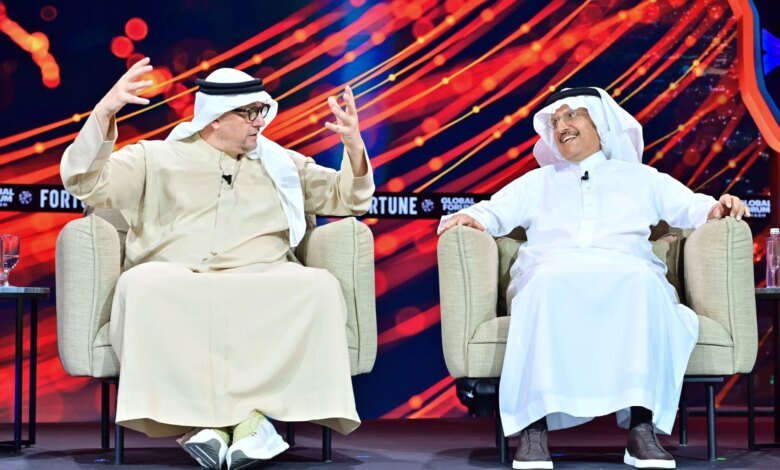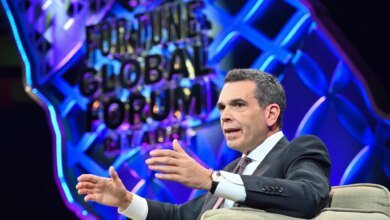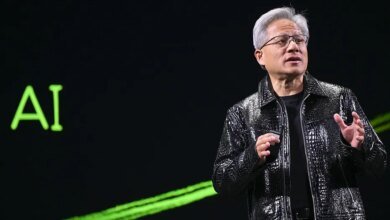Saudi power chair: Tariffs weaken the global energy transition and hurt humanity

The global energy transition continues to move forward, but tariff wars and the increasing politicization of renewable energy are hurting the growth of clean, accessible electricity around the world, said the founder and chairman of ACWA Power Saudi Arabia.
Speaking at the Fortune Global Forum in Riyadh, ACWA Chairman Mohamed Abunayyan and others discussed the global need to rely on the right mix of solar, wind and battery storage, as well as fossil fuels and nuclear to produce enough electricity for people in every part of the world to have access to the safest, cleanest and most affordable energy possible, especially as renewable energy sources become increasingly more competitive. In terms of cost.
But Abunayyan warned of the “huge inconvenience” of rising trade barriers – without specifically mentioning the trade wars started by US president Donald Trump – and praised China for leading the world in the energy transition. He said politicians should distance themselves more from energy politics. He added that it is harmful for world leaders to say that green energy or wind energy is “not good,” without mentioning Trump and his attacks on wind energy and other renewable energy sources.
“These barriers related to imports and exports, and all these issues, make things more complicated for the world,” Abunayan said. “They make it very expensive for everyone. We are just creating barriers unnecessarily and for no reason. The whole world needs each other.” “There is no country that does not need others. We are all human beings on this Earth. We need to work together, we need to integrate, and we need to think about how to create something good for all our people on this Earth.”
Aside from being a pioneer in the development of renewable energy sources, Aqua is also building the world’s largest green hydrogen project in Saudi Arabia for ammonia production, the NEOM Green Hydrogen Project, which is scheduled for completion in 2027.
Aqua, 50% owned by a Saudi sovereign wealth fund, has grown into one of the world’s largest renewable energy and water desalination players, developing projects in Saudi Arabia and throughout Asia and Africa, including China. China Southern Power Grid has a significant stake in some of ACWA’s Asian wind energy businesses.
Abunayyan also praised “Chinese innovation” for leading the energy transition, especially with China controlling the largest supply chains for wind turbines, solar panels and battery components. “If there is no China, there will be no energy transition,” he added. “We have to give full credit to Chinese innovation, scale, competitiveness and providing solutions to the world [so] That they will be able to engage in energy transformation.
Likewise, Abu Dhabi-based Masdar City is helping the UAE and other Middle Eastern countries shift to renewable energy sources for domestic power generation, even as they remain major oil exporters globally.
Striking the right balance
Mohamed Jameel Al Ramahi, CEO of Masdar, said the UAE aims to generate 50% of its electricity needs from renewable energy sources by 2030. One of the key elements is the one-gigawatt Masdar round-the-clock renewable energy project that broke ground in Abu Dhabi in October. He said the project is a combination of solar and battery storage — coupled with artificial intelligence software management — that will provide power 99% of the time, eliminating the intermittency problems pointed out by critics of renewable energy.
“We can now control the power of the sun,” Al Ramahi said. “We store it during the day, produce it during the day, and then send it out during the night.” “This may have been planned and could be replicated elsewhere.”
The CEO of France-based multinational utility giant Engie agreed on the need to embrace renewable energy sources and diversify energy.
Catherine MacGregor, CEO of Engie, said that Engie is investing in renewable energy sources more than any other source of energy, but this does not mean building only solar farms in every corner of the world. Doing so would lead to an unreliable and inefficient power grid.
“This is not going to be the technology that saves the world,” she said. “Very smart integration, a smart grid based on technology will be the solution on the energy side.”
However, it is crucial to focus on making new electricity generation as environmentally friendly as possible – whether that is new demand or replacing old assets – while relying on which low-carbon generation sources make the most sense for each geographic region or nation.
“We are more confident than ever that we are pointing in the right direction, with the caveat that projects must be good projects,” MacGregor said. “You need to supply the right electrons at the right times. The electricity you produce must have the right profile that customers need.”
Don’t miss more hot News like this! Click here to discover the latest in Business news!
2025-10-28 20:12:00




